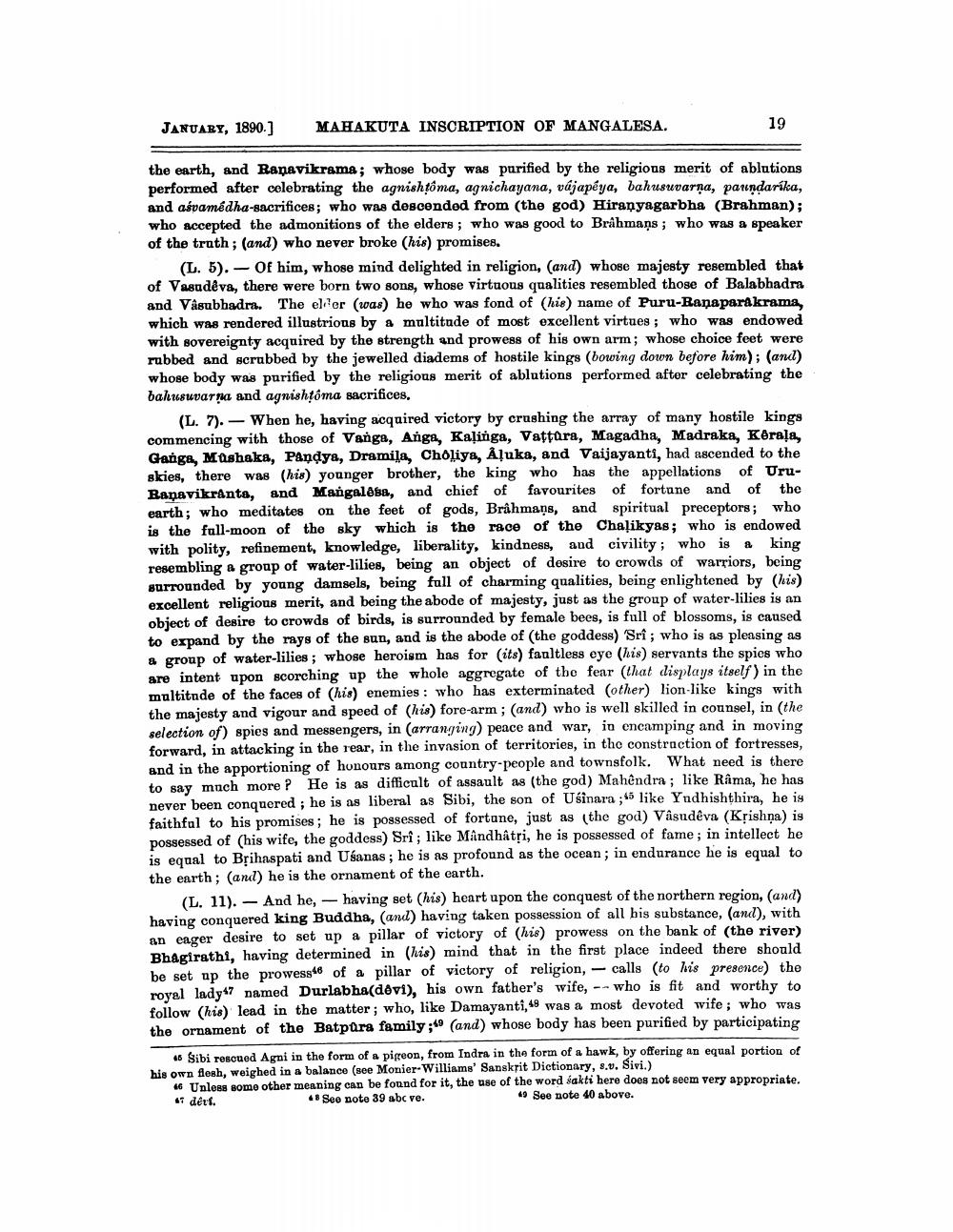________________
JANUARY, 1890.)
MAHAKUTA INSCRIPTION OF MANGALESA.
19
the earth, and Ranavikrama; whose body was purified by the religious merit of ablutions performed after celebrating the agnishtôma, agnichayana, vájapéya, bahusuvarna, parndaríka, and aśvamedha-sacrifices; who was descended from the god) Hiranyagarbha (Brahman); who accepted the admonitions of the elders; who was good to Brahmans; who was a speaker of the truth; (and) who never broke (his) promises.
(L. 5). - Of him, whose mind delighted in religion, (and) whose majesty resembled that of Vasudeva, there were born two sons, whose virtuous qualities resembled those of Balabhadra and Vasubhadra. The eliter (was) he who was fond of (hie) name of Puru-Ranaparakrama which was rendered illustrious by a multitude of most excellent virtues; who was endowed with sovereignty acquired by the strength and prowess of his own arm; whose choice feet were rubbed and scrubbed by the jewelled diadems of hostile kings (bowing down before him); (anul) whose body was purified by the religious merit of ablutions performed after celebrating the bahrsuvarna and agnishtoma sacrifices.
(L. 7). - When he, having acquired victory by crushing the array of many hostile kings commencing with those of Vange, Anga, Kalinga, Vattura, Magadha, Madraka, Kerala, Ganga, Mashaka, Pandya, Dramila, Choliya, Åļuka, and Vaijayanti, had ascended to the skies, there was (his) younger brother, the king who has the appellations of UruRanavikranta, and Mangaldsa, and chief of favourites of fortune and of the earth; who meditates on the feet of gods, Brihmans, and spiritual preceptors; who is the full-moon of the sky which is the race of the Chaļikyas; who is endowed with polity, refinement, knowledge, liberality, kindness, and civility; who is a king resembling a group of water-lilies, being an object of desire to crowds of warriors, being surrounded by young damsels, being full of charming qualities, being enlightened by (his) excellent religious merit, and being the abode of majesty, just as the group of water-lilies is an object of desire to crowds of birds, is surrounded by female bees, is full of blossoms, is caused to expand by the rays of the sun, and is the abode of (the goddess) Sri; who is as pleasing as & group of water-lilies; whose heroism has for (its) faultless eye (his) servants the spies who are intent upon scorching up the whole aggregate of the fear (that displays itself in the multitude of the faces of (his) enemies : who has exterminated (other) lion-like kings with the majesty and vigour and speed of (his) fore-arm; (and) who is well skilled in counsel, in the selection of) spies and messengers, in (arranging) peace and war, in encamping and in moving forward, in attacking in the rear, in the invasion of territories, in the construction of fortresses, and in the apportioning of honours among country people and townsfolk. What need is there to say much more? He is as difficult of assault as the god) Mahendra; like Rama, he has never been conquered; he is as liberal as Sibi, the son of Usinara;like Yudhishthira, he is faithful to his promises; he is possessed of fortune, just as the god) Vasudeva (Krishna) is possessed of (his wife, the goddess) Srî; like Mandhâtội, he is possessed of fame; in intellect he is equal to Bțihaspati and Ušanas; he is as profound as the ocean; in endurance he is equal to the earth; (anal) he is the ornament of the earth.
(L. 11). - And he, having set (his) heart upon the conquest of the northern region, (and) having conquered king Buddha, (anal) having taken possession of all his substance, (and), with an eager desire to set up a pillar of victory of (his) prowess on the bank of the river) Bhagirathi, having determined in (his) mind that in the first place indeed there should be set up the prowess of a pillar of victory of religion, - calls (to his presence) the royal lady? named Durlabha(dėvi), his own father's wife, -- who is fit and worthy to follow (his) lead in the matter; who, like Damayanti, 48 was a most devoted wife; who was the ornament of the Batpura family;t' (and) whose body has been purified by participating
48 Sibi rosoud Agni in the form of a pireon, from Indra in the form of a hawk, by offering an equal portion of his own flesh, weighed in a balance (see Monier-Williams' Sanskrit Dictionary, 8.0. Sivi.)
Unless somo other meaning can be found for it, the use of the word sakti here does not seem very appropriate. 61 dêtí. ** See note 39 abc ve.
49 See note 40 above.




